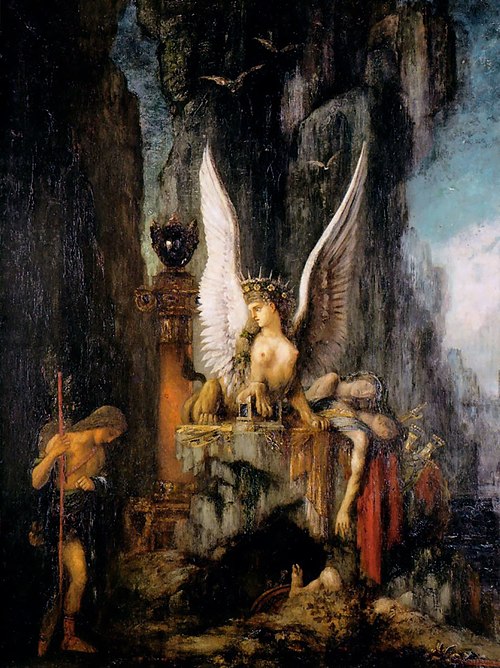Greek Tragedy: Difference between revisions
m (Added infobox.) |
m (Grlucas moved page Greek Tragedy to Greek Tragedy/Introduction) |
(No difference)
| |
Revision as of 10:21, 3 April 2023
Greek tragedy is one of the most important genres in the history of literature and drama, and it has had a profound impact on Western culture. Tragedy, tragoidos or “goat-song,” originated in ancient Greece in the 5th century BCE and was typically performed during religious festivals in honor of the god Dionysus. The plays were written and performed by male actors, and they usually focused on myths and legends from Greek mythology. Greek tragedies were typically performed in a single day and in a single location, with a focus on a single dramatic action. This convention is known as the unity of time, place, and action and helped to create a sense of tension and immediacy. The three most famous Greek tragedians were Aeschylus, Sophocles, and Euripides, and their works are still studied and performed today. [[
One of the key conventions of Greek tragedy is the use of a chorus. The chorus was a group of actors who would sing and dance, commenting on the action of the play and offering moral and ethical judgments. The chorus was an essential part of Greek tragedy, and it helped to create a sense of community and shared experience among the audience.
Actors in Greek tragedy wore masks that allowed them to play multiple roles and helped to amplify their voices in the large outdoor theaters where the plays were performed. The masks also helped to create a sense of distance between the actors and the audience.
The central protagonist, or the tragic hero, was a character who was typically of high rank or status, but who is brought down by their own harmartia, a character trait or “tragic flaw” that leads to their downfall. For example, in Sophocles’ tragedy Oedipus Rex, the harmartia of the tragic hero Oedipus is his pride and his belief in his own intelligence. This leads him to ignore warnings and to make decisions that ultimately lead to his tragic fate. Harmartia creates a sense of inevitability and helps to drive the plot. It also helps to make the tragic hero more relatable to the audience, as they see in them their own human frailties and flaws. Because of this flaw, the tragic hero was often a sympathetic character, and the audience was meant to feel both pity and fear for him or her.
Peripeteia or reversal of fortune, another key convention of Greek tragedy, occurs when a character experiences a sudden and dramatic change in their circumstances, often as a result of their harmartia. In Oedipus Rex, the revelation that Oedipus has unwittingly fulfilled a prophecy by killing his father and marrying his mother leads to a dramatic reversal of his fortunes.
Similarly, anagnorisis refers to a moment when a character suddenly realizes the truth about themselves or their situation, leading to a profound change in their understanding of the world. Aristotle defines anagnorisis as a recognition, or “a change from ignorance to knowledge, producing love or hate between the persons destined by the poet for good or bad fortune.” Anagnorisis often works in tandem with the concept of harmartia. The recognition of one’s own flaw or the tragic situation they are in leads to the character’s downfall or tragic fate. For example, in Sophocles’ Oedipus Rex, Oedipus realizes his tragic fate when he discovers that he has unwittingly fulfilled a prophecy by killing his father and marrying his mother. This realization leads to his downfall.
The actions of the tragedy lead to catharsis, the emotional release and purification that the audience experiences through the tragic events of the play, is another important element of Greek tragedy. The audience is meant to feel a sense of empathy with the tragic hero, experiencing their suffering and gaining a greater understanding of the human condition.
The use of fate or destiny are also important in Greek tragedy. The characters in the plays were often subject to the whims of the gods, and their actions were seen as part of a larger cosmic plan, even if that plan was unknown to the participants. The idea of fate or destiny added a sense of inevitability to the plays, and it created a sense of tension and drama as the characters struggled to overcome their preordained fate. The struggle between fate and free will in the tragedies seemed to suggest that the universe is not perfectly ordered and is often absurd leading to the death of great people and teh triumph of mediocrity.
Greek tragedy was known for its use of symbolism and metaphor. The plays were often filled with imagery and symbolism drawn from Greek mythology and culture, and these symbols were used to explore deeper themes and ideas. For example, the symbol of the Oresteia, a trilogy of plays by Aeschylus, was the curse of the house of Atreus, which was passed down from generation to generation.
The lasting impact of Greek tragedy on Western culture is undeniable. The plays have influenced countless writers and artists throughout the centuries, and they continue to be studied and performed today. The conventions of Greek tragedy have also been adopted by other cultures and genres, from Shakespearean tragedies to modern-day television dramas. Studying Greek tragedy is an essential part of understanding the history and development of literature and drama.
